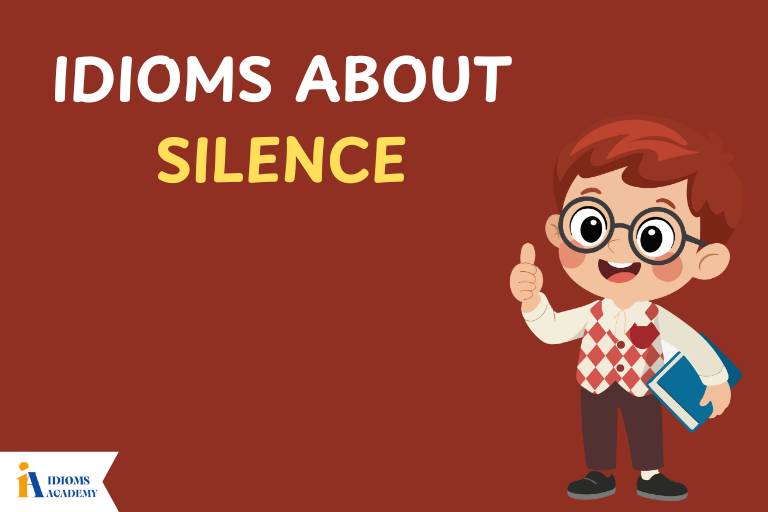Fairness is when people are treated in a just and equal way. It means making choices that are right and kind. When things are fair, everyone gets a chance. If someone is playing a game, being fair means following the rules and taking turns. If someone makes a mistake, being fair means listening and giving them a chance to explain.
People often use special phrases, called idioms, to talk about fairness. These idioms help make ideas clearer and easier to understand. For example, if someone says, “play fair,” it doesn’t mean they are actually playing. It means they should treat others kindly and follow the rules. In this article, you will learn 25 idioms about fairness. Each one will have a meaning, some example sentences, and fun facts to help you remember them.
Idioms About Fairness
1. Play fair
Meaning: Follow the rules and be honest.
Example Sentence: Let’s play fair during the board game. The coach told the team to play fair.
Other ways to say: Be honest, follow the rules
Fun Fact/Origin: This idiom comes from sports, where following the rules is important.
Usage: Used to remind people to be fair and not cheat.
2. On the level
Meaning: Honest and fair
Example Sentence: I know she’s on the level because she tells the truth. Is this deal on the level, or are you tricking me?
Other ways to say: Honest, truthful
Fun Fact/Origin: Comes from carpentry tools used to check if something is straight.
Usage: Used when checking if someone is being honest.
3. Level playing field
Meaning: Everyone has the same chance
Example Sentence: The new rule made it a level playing field. We need a level playing field in the spelling contest.
Other ways to say: Equal chances, fair start
Fun Fact/Origin: Comes from sports fields being flat so no one has an advantage.
Usage: Used when talking about fairness in competition.
4. Give someone a fair shake
Meaning: Treat someone fairly
Example Sentence: Give her a fair shake before judging. Everyone should get a fair shake at trying out.
Other ways to say: Give a chance, treat equally
Fun Fact/Origin: “Shake” used to mean deal or try.
Usage: Used when asking for fair treatment.
5. Fair and square
Meaning: Honest and legal
Example Sentence: He won the race fair and square. We paid for the snacks fair and square.
Other ways to say: Honestly, without cheating
Fun Fact/Origin: “Square” once meant honest or straight.
Usage: Used to describe actions done fairly.
6. Right as rain
Meaning: Completely correct or fair
Example Sentence: Her answer was right as rain. That decision was right as rain.
Other ways to say: Correct, fair
Fun Fact/Origin: “Right as rain” is from England and means everything is good.
Usage: Used when something is clearly fair or correct.
7. Tip the scales
Meaning: Change things to make it unfair
Example Sentence: Adding an extra rule tipped the scales. The teacher didn’t want to tip the scales.
Other ways to say: Make unfair, unbalance
Fun Fact/Origin: Comes from balance scales used to measure weight fairly.
Usage: Used when someone changes things to make them unfair.
8. Settle the score
Meaning: Make things fair again
Example Sentence: He wanted to settle the score after losing last time. They played again to settle the score.
Other ways to say: Make even, fix unfairness
Fun Fact/Origin: “Score” used to mean keeping count in games.
Usage: Used when someone wants to fix a past loss or wrong.
9. Weigh the evidence
Meaning: Look at all the facts fairly
Example Sentence: The judge had to weigh the evidence. We should weigh the evidence before deciding.
Other ways to say: Think carefully, judge fairly
Fun Fact/Origin: Comes from old court systems that compared facts like weight.
Usage: Used when making a fair decision.
10. Square deal
Meaning: A fair agreement
Example Sentence: That was a square deal for both of us. She made sure we had a square deal.
Other ways to say: Fair trade, honest agreement
Fun Fact/Origin: Popularized by U.S. President Theodore Roosevelt for fairness.
Usage: Used when both sides get treated fairly.
11. Rule of thumb
Meaning: A simple rule that is usually fair
Example Sentence: The rule of thumb is to take turns. A good rule of thumb is to be kind to others.
Other ways to say: General rule, basic guide
Fun Fact/Origin: Comes from using the thumb to measure things.
Usage: Used to describe simple, fair ways to decide things.
12. Call it even
Meaning: Agree that things are now fair
Example Sentence: I helped you last week, so let’s call it even. They called it even after both apologized.
Other ways to say: All square, balanced
Fun Fact/Origin: Comes from keeping scores where both sides match.
Usage: Used when two sides agree everything is fair now.
13. Even playing field
Meaning: Everyone has the same chance to win
Example Sentence: The new coach gave everyone an even playing field. Let’s make it an even playing field by giving her more time.
Other ways to say: Equal chance, no unfair advantage
Fun Fact/Origin: Similar to “level playing field,” it means no one has it easier.
Usage: Used when giving equal chances to everyone.
14. By the book
Meaning: Follow the rules exactly
Example Sentence: She does everything by the book. He ran the race by the book and didn’t cheat.
Other ways to say: Follow rules, go by the rules
Fun Fact/Origin: Comes from law books or rule books.
Usage: Used when someone is being extra fair by following rules.
15. Justice is blind
Meaning: Fairness should not see who you are
Example Sentence: The judge showed that justice is blind. Fair rules mean justice is blind.
Other ways to say: Fair to all, no favorites
Fun Fact/Origin: The idea comes from statues showing a blindfolded woman holding scales.
Usage: Used to mean people should be treated fairly no matter who they are.
16. A fair shot
Meaning: A fair chance to try
Example Sentence: Everyone should get a fair shot at winning. She gave him a fair shot at the game.
Other ways to say: Equal chance, fair try
Fun Fact/Origin: May come from sports or hunting, meaning one good chance.
Usage: Used when giving someone the same chance as others.
17. Split down the middle
Meaning: Divide something equally
Example Sentence: Let’s split the cookie down the middle. They split the chores down the middle.
Other ways to say: Divide evenly, share fairly
Fun Fact/Origin: Comes from the idea of cutting something into two even parts.
Usage: Used when dividing things fairly.
18. What’s good for the goose is good for the gander
Meaning: The same rules should apply to everyone
Example Sentence: If she gets extra time, he should too. What’s good for the goose is good for the gander.
Other ways to say: Same rules for all, treat equally
Fun Fact/Origin: Goose and gander are male and female geese, so the saying means treat both the same.
Usage: Used when someone wants fairness for all.
19. No strings attached
Meaning: Fair deal with no tricks
Example Sentence: I gave him the toy with no strings attached. She got a gift with no strings attached.
Other ways to say: No catch, no hidden rules
Fun Fact/Origin: Used to mean no secret demands in a deal.
Usage: Used when something is given or done fairly and simply.
20. Come clean
Meaning: Be honest and fair
Example Sentence: He decided to come clean about what happened. She came clean about the mistake.
Other ways to say: Tell the truth, admit it
Fun Fact/Origin: “Clean” means pure, so coming clean means being honest.
Usage: Used when someone tells the truth to make things fair.
21. On equal footing
Meaning: Being at the same level as someone else
Example Sentence: After training, they were on equal footing. Give her a chance to be on equal footing.
Other ways to say: Same level, equal chance
Fun Fact/Origin: “Footing” comes from standing on solid ground.
Usage: Used to show that people are being treated fairly.
22. Even the odds
Meaning: Make a situation more fair
Example Sentence: He helped even the odds by sharing the answer. The new rule will even the odds.
Other ways to say: Balance things out, make fair
Fun Fact/Origin: Odds are used in games or bets, and even odds mean equal chance.
Usage: Used when someone helps make things fair.
23. Take sides
Meaning: Support one person over another
Example Sentence: Don’t take sides, be fair. The teacher didn’t take sides in the argument.
Other ways to say: Be neutral, stay fair
Fun Fact/Origin: Comes from people choosing a team or position.
Usage: Used when someone is expected to be fair.
24. Pull your weight
Meaning: Do your fair share of work
Example Sentence: Everyone has to pull their weight in group projects. She pulled her weight on the team.
Other ways to say: Do your part, help fairly
Fun Fact/Origin: From rowing, where each rower must pull evenly.
Usage: Used when fairness means everyone helps.
25. No favoritism
Meaning: Treating everyone the same
Example Sentence: The coach showed no favoritism. Good teachers don’t show favoritism.
Other ways to say: Treat fairly, no special treatment
Fun Fact/Origin: Favoritism means giving extra to someone without reason.
Usage: Used when someone is fair and doesn’t give extra help to one person.
Quiz: Idioms About Fairness
Instructions: Read each question and the answer choices carefully. Pick the letter that best matches the meaning of the phrase or expression.
Question Key
1. What does “play fair” mean?
A) Be sneaky during a game
B) Follow the rules and be honest
C) Let others do all the work
2. If someone is “on the level,” they are:
A) Hiding something
B) Being dishonest
C) Telling the truth and being fair
3. A “level playing field” means:
A) One person has an advantage
B) Everyone has the same chance
C) The ground is slanted
4. If someone says “give her a fair shake,” what do they want?
A) To ignore her
B) To treat her fairly
C) To take her toy
5. What does “fair and square” mean?
A) Something was unfair
B) It happened by mistake
C) It was done honestly and fairly
6. If someone says “split it down the middle,” what should you do?
A) Keep everything
B) Share it equally
C) Give it away
7. What does “call it even” mean?
A) One person gets more
B) Both people are now equal
C) Start a new game
8. If someone says “no strings attached,” it means:
A) You owe them a favor
B) There are no secret rules
C) You have to pay later
9. What does it mean to “pull your weight”?
A) Work too hard
B) Be the leader
C) Do your fair share
10. If someone “takes sides,” are they being fair?
A) Yes, to everyone
B) No, they are picking favorites
C) It depends on the game
Answer Key
- B) Follow the rules and be honest
- C) Telling the truth and being fair
- B) Everyone has the same chance
- B) To treat her fairly
- C) It was done honestly and fairly
- B) Share it equally
- B) Both people are now equal
- B) There are no secret rules
- C) Do your fair share
- B) No, they are picking favorites
Wrapping Up
Idioms about fairness help us talk about being just and kind in simple ways. They teach us how to treat people equally and to do the right thing. These idioms can be used at school, at home, or in sports. By learning them, we can better explain what fairness means and how it looks in real life.
Fairness is important for friendships, games, and making good choices. Using the right idioms can help us share our thoughts clearly and understand others better.



